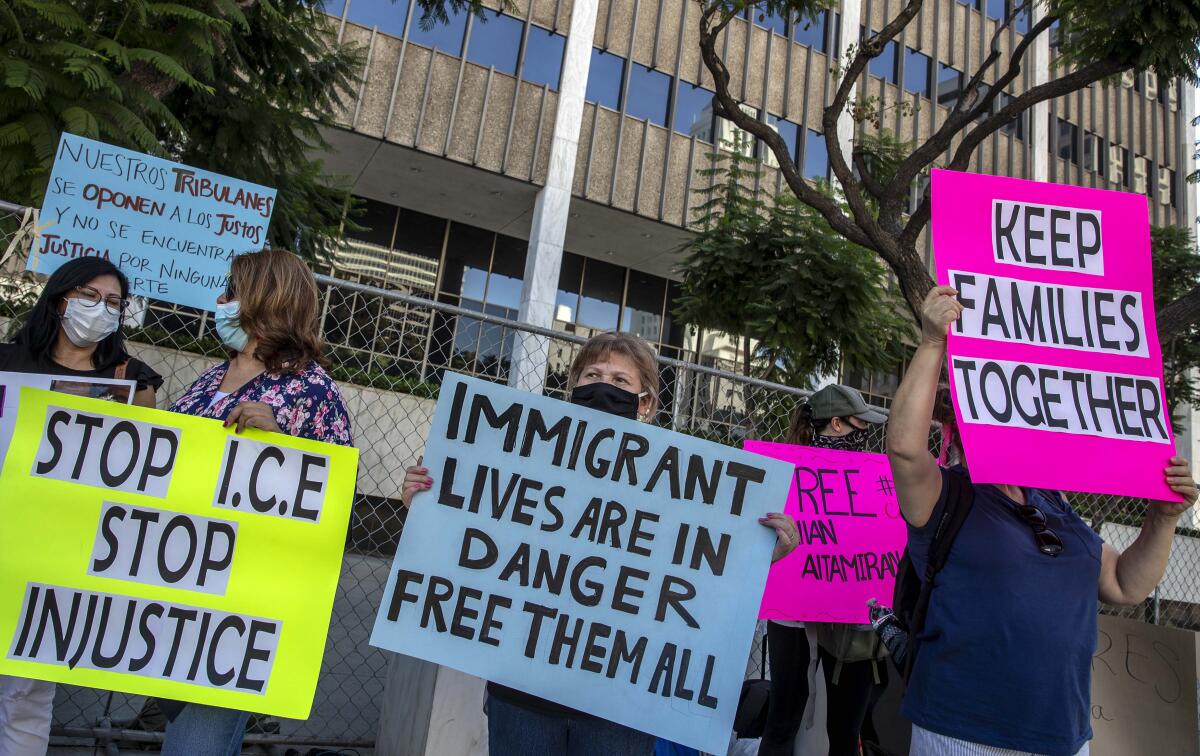Op-Ed: How to reverse Trump’s immigration disasters — even without Congress

- Share via
Of all the promises Donald Trump made during the 2016 campaign, his pledge to crack down on immigration is the one he has come closest to keeping. Since the beginning, the Trump administration has taken a sledgehammer to immigration policy. The right to asylum viciously attacked. Human rights abuses flourishing in the immigration detention system. Legal immigration slowed to a crawl. The Muslim Ban. The effort to end DACA. Family separation at the border. The list goes on.
Fortunately, Joe Biden has the power to reverse those policies when he takes office in January. Because Trump used executive action to carry out his immigration agenda, Biden can unwind it in the same way — even without the cooperation of Congress.
Recent news reports suggest that Biden plans to take swift action to reinstate the Deferred Action for Childhood Arrivals program, known as DACA, repeal the Muslim ban and end the “Remain in Mexico” program that has left asylum seekers languishing in refugee camps across the U.S.-Mexico border. But a lot of the damage done to the system was through hundreds of smaller immigration policy changes that did not receive much public or press notice even though they did enormous harm to immigrants.
The Biden administration can end some of these policies with the stroke of a pen. For instance, it can stop threatening human trafficking victims with deportation if their applications for U and T visas for crime victims are denied. Similarly, policies requiring Immigration and Customs Enforcement to make “collateral arrests”— people ICE is not targeting but are encountered during enforcement actions — and prohibiting ICE from exercising discretion in deportation proceedings could be changed immediately as well.
Biden’s attorney general will also be able to reverse some of the changes using his or her authority to issue decisions interpreting immigration law. For example, the new attorney general could reverse decisions issued by former Atty. Gen. Jeff Sessions that made it next to impossible for domestic violence victims to win asylum and prohibited immigration judges from managing their dockets to give immigrants time to apply for green cards through family members.
Other policies will require formal rule-making to change. The Biden Department of Homeland Security should, for example, revise a regulation that greatly limits the ability of asylum seekers to obtain work authorization while they wait for their application to be adjudicated in the overburdened system. It should also rescind another regulation that expanded the use of expedited removal to allow many undocumented immigrants to be deported without a hearing.
What will be harder to repair is the department’s culture of lawlessness, which has grown worse in the Trump era. The Obama administration struggled to get ICE and Border Patrol to carry out its policy objectives. Indeed, the ICE union even sued the Obama administration over DACA, alleging that it required immigration agents to violate their duty to enforce immigration laws. The Trump administration, on the other hand, has encouraged rule-breaking, and Homeland Security employees took full advantage of the lack of oversight and standards of conduct. The result is an agency that has repeatedly violated people’s rights in the name of immigration enforcement and then lies about it in court.
It will be difficult for the incoming political appointees to reestablish rule of law, but they must try. It seems unlikely that Biden will “abolish ICE,” but he must think strategically about how to reform the department.
Even if he successfully unwinds Trump’s policy changes and puts in new leadership to alter the Homeland Security Department’s culture, we would still be left with the immigration system that existed during the Obama years, which was far from perfect. While the Obama administration advanced some pro-immigrant policies by executive action — DACA and the enforcement priorities that focused ICE attention on immigrants with criminal records being the most well-known examples — he also oversaw more than 3 million deportations. Far too many avoidable tragedies were allowed to occur. And of course, that administration and allies in Congress failed to pass desperately needed comprehensive immigration reform.
A Republican Senate will make it difficult to get an immigration reform bill through Congress, but Biden has other tools at his disposal. For example, there are millions of undocumented immigrants who would be eligible to apply for green cards except that they were not “admitted or paroled” into the country. Their only option now is to return home and endure a lengthy process that can keep them separated from their family for years. Biden could use his parole power to “parole-in-place” these individuals so that they can apply for green cards without leaving the country.
He could also drastically reduce the number of immigrants in lockup by using alternatives to detention such as ankle monitors. He could reform immigration courts through administrative rule-making so that they provide a real, independent check on DHS’s deportation power. These actions wouldn’t replace comprehensive legislative reform, but they would help mitigate some of the cruelest aspects of the current system.
Despite Trump’s demonization of immigrants, public opinion is becoming more pro-immigration. A majority of Americans now believe that it should be easier to get asylum in the U.S. as well as support a path to citizenship for undocumented immigrants. More Americans want an increase in immigration rather than a decrease. The last four years have shown the public just how cruel and inhumane the broken immigration system can be. It is now Joe Biden’s job to fix it.
Nicole Hallett is an associate clinical professor of law and director of the Immigrants’ Rights Clinic at the University of Chicago Law School.
More to Read
A cure for the common opinion
Get thought-provoking perspectives with our weekly newsletter.
You may occasionally receive promotional content from the Los Angeles Times.










